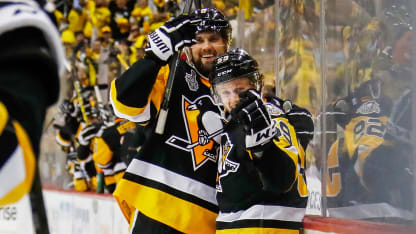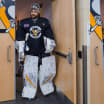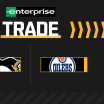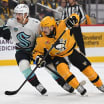This past summer, Brian Dumoulin took the Stanley Cup to Boston College, where he won two national championships as a member of the men's ice hockey team. The next time he returns to campus, he'll be going as a graduate of the school.
Congrats, grads
Dumoulin, Guentzel recently completed their college degrees

By
Michelle Crechiolo
Penguins Team Reporter
Dumoulin recently completed his degree in marketing, something he's been working on ever since he turned professional in the spring of 2012.
At a recent surprise graduation party thrown by his fiancée Kayla Ermold at a restaurant in downtown Pittsburgh - complete with a cap and an Eagles-themed cake - Dumoulin's teammates who joined the celebration made sure to mix in some good-natured chirps with their congratulatory wishes.
"When I was a college dropout, I used to say 'oh, I can't afford to pay for this dinner, I'm going to need you to pay for it. I'm just a college dropout,'" joked Ian Cole. "So now, he can't use that excuse any more, either."
And players like Bryan Rust and Carl Hagelin, who used all four years of their NCAA eligibility, no longer have bragging rights.
"We'll occasionally flaunt it around," Rust joked about the players who received their degrees at the conclusion of their college careers. "Guys who didn't finish or guys who finished late, it doesn't come up often. But when it does, we have the upper hand."
Dumoulin will be more than happy to handle his own tabs moving forward, considering the dedication that it took to receive his diploma, which his dad Pete texted him a picture of when it came in the mail.
"I'm proud," the 26-year-old said. "It took me seven summers to do it. I had eight classes left when I started. It got harder and harder as the years went by to go back because all of my classes I had to do in the classroom, I couldn't do them online."
Then, his final course required for graduation wasn't available during the summers, so Dumoulin arranged to do an independent study in applied marketing for the fall semester with one of his professors. Dumoulin would speak with his teacher - who gave him case studies to read - for a couple of hours once a week.
Usually Dumoulin would try to arrange their conversations for a day off, but a few times he would talk to his professor on the road once they got into the team hotel. The professor would take the slides he used for the classroom lecture that met twice a week and explain them to Dumoulin; then they would discuss the assigned case studies.
"He was awesome, he helped me out a lot," Dumoulin said. "A lot of it was just dialogue. It was more business-focused, and a lot of it was about company decisions. Whether to hire more employees, whether to acquire a company, why to acquire a company and stuff like that. A lot of it was on the higher end of the spectrum with like S&P 500 companies, but it was cool."
Dumoulin's class may have been about company decisions, but in talking with him and some of the other Penguins who either received their degree after using all four years of their college eligibility or continued their education after leaving school, it's truly impressive the amount of thought and planning that have gone into those life decisions.
"I put in a lot of work," Dumoulin said. "To go there for three years and not show anything for it school-wise, that's tough to do. It's almost to the point like, what's the point of doing it if you're only going to go for three years and not get your degree? I think that's the majority of the reason why when I went back for my junior year, was to be able to be in a position where I could get my degree."
Like Dumoulin, Jake Guentzel also has reason to celebrate, as he returned to the University of Nebraska-Omaha over the All-Star break to receive his degree in multidisciplinary studies.
The 23-year-old turned pro in the spring of 2015 with nine classes left to graduate, opting to take two classes a semester while living in Wilkes-Barre and then Pittsburgh. Unlike Dumoulin, he was able to take them online, doing coursework on off days.
"Days off I just tried to get ahead as much as I could. A lot of alone time at home, so I had plenty of time," Guentzel said with a laugh. "It was my mom who said you had to do it right away. I'd rather get it done right away than hold out for a couple years and then not want to do it at all. It was good to get it done."
For the Penguins who grew up in the United States, a lot of times, going to college is the next logical step. Not so much for Hagelin, who grew up in Sweden, but became just the second European player to ever skate for the University of Michigan men's ice hockey team.
His father Boris had come to North America to attend college at Western Michigan University, and he had cousins that lived in a suburb of Detroit called Bloomfield Hills just outside of Ann Arbor, where the University of Michigan's campus is located.
The Hagelin family visited those cousins for four summers while Carl was growing up. During that time, he and his older brother Bobbie attended longtime Wolverines men's ice hockey coach Red Berenson's camp, since Boris had always loved the school. But, as Carl joked, "he couldn't get in." Boris did, however, pass down his passion for the Maize and Blue.
When Carl was passed over in the first NHL Draft he was eligible for - and then not chosen until the sixth round (168th overall) the following year - he decided that he would follow in his father's footsteps and come to America to get his degree while playing college hockey. The plan was to stay for all four years regardless of what opportunities came up.
"I came over to get my degree," Hagelin said. "Otherwise I could have just stayed at home and played pro, you know?"
Hagelin received a scholarship to play at Michigan, where he thrived both on and off the ice. He enrolled in the School of Kinesiology and majored in sport management, earning the U of M Athletic Academic Achievement Award all four years and being named to the CCHA Scholar Athlete Team his last three years.
During Hagelin's senior year, his academic achievements included receiving U of M's Big Ten Conference Medal of Honor while being named a Big Ten Distinguished Scholar and Academic All-Big Ten.
"I knew the business school was super hard, so it would have taken too much time from my hockey," Hagelin said. "So I decided to do sport management. The first two years were very general, you have to take all the prereqs. I actually really enjoyed them, especially the finance classes. Numbers have always been interesting to me. Once I got into the program, it got a lot easier and you paid more attention because you actually enjoyed some of the classes."
After graduating in 2011 and turning professional with the New York Rangers, Hagelin's NHL career has since turned out better than he probably ever could have dreamed. He's a two-time Stanley Cup champion that has skated in 112 postseason games since entering the league in the 2011-12 season, more than any other player. Things are certainly going well for the present, but Hagelin is still thinking about his future.
"I keep in touch with one of my professors from college and then I have some businesspeople I've met through playing in New York," he said. "(I'll go into) either real estate or finance, one of the two. But I'll probably move home and do it. So my connections here won't be as useful as if I stay, but it's that area."
If Hagelin did remain in North America, perhaps he, Bryan Rust and Rust's brother Matt - who was Hagelin's teammate at Michigan - can go into business together.
Rust received his degree in finance from Notre Dame, since he's always liked math and has always been good at it. It's something that runs in the family, as his mom Betsy is a CPA and his dad Steve also started out as an accountant before moving into the finance side of banking. When Bryan is done playing, he may follow in Matt's footsteps, who's continuing on the family tradition.
"Probably something in real estate or finance. That's always something that's been intriguing to me," Rust said of his post-NHL career. "My brother works in that department right now and seems to love it."
Going to college certainly isn't for everyone. Plenty of guys decide to play major junior hockey, which is the right decision for them. But for the guys that did play NCAA hockey, they enjoyed their college experience and it's been fun for them to see other players follow the same path.
"I think slowly but surely more players are taking the college route just because they know that there have been a lot of players who have been successful coming from college hockey," Rust said. "You see it growing. I think it's definitely growing in the right direction."


















































